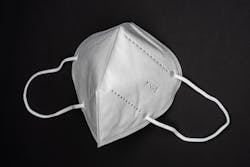Up to seventy percent of KN95 masks do not meet U.S. standards
An analysis by ECRI, a patient safety organization, shows that up to 70 percent of the KN95 masks it tested do not meet U.S. standards for effective filtration, raising the risk that providers or patients will become infected with SARS-CoV-2, according to a press release from ECRI.
The masks were imported from China by some of the largest health systems, according to ECRI.
ECRI tested nearly 200 masks, comprised of 15 different manufacturer models, and found that between 60 and 70 percent of the KN95 masks imported from China do not provide 95 percent filtration performance, which is the U.S. National Institute for Occupational Safety and Health (NIOSH) N95 standard. All of the KN95 masks that ECRI tested have ear loops to hold them in place, rather than head and neck straps, which tend to better conform to the user’s face, the organization said.
ECRI said the testing was done according to rigorous product testing protocols at its independent medical device laboratory.
“U.S. hospitals bought hundreds of thousands of masks produced in China over the past six months, and we’re finding that many aren’t safe and effective against the spread of COVID-19,” said Marcus Schabacker, MD, PhD, ECRI’s President and Chief Executive Officer. “We strongly recommend that healthcare providers going forward do more due diligence before purchasing masks that aren’t made or certified in America.”
Although the majority of imported KN95 masks tested do not meet NIOSH standards, ECRI researchers said the KN95s can be used in lieu of surgical or procedure masks for activities that involve limited contact with bodily fluids (because KN95s are not intended for fluid repellency), and they may provide superior respiratory protection.

